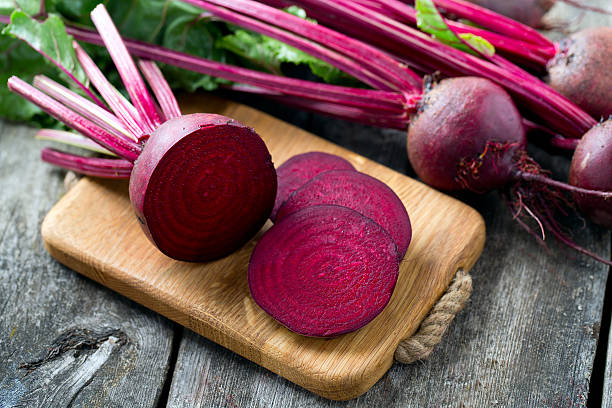Articles

Why You Should Include Beetroot in Your Diet
What is Beetroot?
Beetroot, also known as beet, is a root vegetable with a deep red or purple color and a slightly sweet taste. It is primarily cultivated for its roots but also produces edible greens known as beet greens. Beetroot has numerous health benefits, especially for the skin and hair, and is suitable for individuals with type 2 diabetes. It can be incorporated into your diet in various ways, such as in a healthy beetroot salad.
The vibrant red color of beetroot comes from a compound called betalain, which balances stomach acidity and aids digestion.
Nutritional Content of Beetroot
Every 100 grams of beetroot contains:
| Nutrient | Amount | % Daily Requirement |
|---|---|---|
| Calories | 43 kcal | — |
| Carbohydrates | 9.6 g | — |
| Dietary Fiber | 2.8 g | — |
| Protein | 1.6 g | — |
| Fat | 0.2 g | — |
| Vitamin C | 3.6 mg | ~6% |
| Folic Acid (B9) | 109 mcg | ~27% |
| Vitamin B6 | 0.1 mg | — |
| Iron | 0.8 mg | — |
| Magnesium | 23 mg | — |
| Potassium | 325 mg | ~5% |
| Phosphorus | 40 mg | — |
| Calcium | 16 mg | ~1.5% |
Key Health Benefits of Beetroot
Anti-inflammatory Properties
- Beetroot contains betaines, which work with other nutrients to reduce homocysteine, a compound that can harm blood vessels. This contributes to a lower risk of heart disease, stroke, and vascular conditions.
Rich in Fiber
- With 3.81 grams of fiber per cup, beetroot helps regulate blood sugar levels, maintain a healthy weight, lower cholesterol, and support healthy blood circulation.
- A fiber-rich diet can reduce the risk of colon cancer, heart disease, and inflammatory bowel disease.
Improves Blood Pressure
- Beetroot contains nitrates, which help relax blood vessels, lowering blood pressure and improving brain function and athletic performance.
Anemia Treatment
- Beetroot juice is often used to treat anemia and boost iron levels in the blood.
Reduces LDL Cholesterol
- Beetroot may help lower harmful cholesterol levels, promoting cardiovascular health.
Anti-tumor Properties
- Studies suggest that beetroot acts as a chemopreventive agent, reducing the formation of tumors and showing low toxicity.
Can Diabetics Eat Beetroot?
Yes, individuals with type 2 diabetes can safely consume beetroot.
- Beetroot contains betaine and other phytochemicals that regulate glucose and insulin levels.
- It aids in controlling blood sugar and blood pressure, making it a valuable addition to diabetic diets.
Beetroot's Benefits for Skin and Hair
Skin Benefits
- Reduces Acne and Scars: High in vitamin C, beetroot minimizes excess oil and prevents breakouts.
- Detoxifies the Skin: Drinking beetroot juice helps cleanse the blood, reducing acne and promoting a glowing complexion.
- Hydrates Skin: With 87% water content, beetroot effectively moisturizes the skin.
Hair Benefits
- Prevents Hair Loss: Rich in potassium and iron, beetroot strengthens weak hair and reduces breakage.
- Treats Dandruff: Its anti-inflammatory properties help alleviate scalp dryness and reduce dandruff.
How to Add Beetroot to Your Diet
- Boiled or Roasted Beetroot
- Beetroot Salads:
- Beetroot, parsley, walnuts, and a squeeze of lemon.
- Beetroot, mayonnaise, and walnuts.
- Beetroot, parsley, and grilled halloumi cheese.
- Beetroot Juice:
- Beetroot and orange.
- Beetroot, orange, and apple.
Conclusion
Beetroot is not only delicious but also packed with health benefits. Incorporating it into your diet, whether fresh or in recipes, can improve overall health and well-being. With its rich nutritional profile and potential medicinal properties, beetroot is an excellent choice for a vibrant and healthy diet.
References
https://fdc.nal.usda.gov/fdc-app.html#/food-details/169145/nutrients
https://health.clevelandclinic.org/the-health-benefits-of-beets
https://www.thevegannutritionist.co.uk/beetroot-juice-for-diabetics
https://www.bebeautiful.in/all-things-skin/everyday/8-ways-how-beetroot-benefits-your-skin-and-hair
